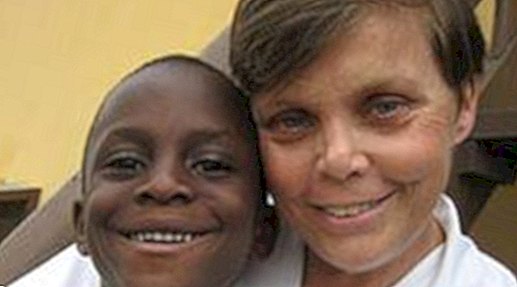In the cinema: Egoiste - Lotti Latrous


Two of countless destinies
As the little one Junior brought to Lotti Latrous in the outpatient clinic, he weighs only 6.3 pounds. Junior has AIDS. His mother succumbed to the deadly virus, and his father, a wealthy businessman, can not take care of his son. Madame Lotti strokes the little boy's face, reading stories to him. Next to his bed are Christmas presents. Junior does not wake up on Christmas morning.
Florence is 23 years old and will not experience the next day. Her trembling hands betray her fear of death, which she has not wanted to redeem in days. Her breathing is shallow, her eyes look exhausted on Lotti, who stands by her side and does not move from the side during the last hours.

Madame Lotti, as Lotti Latrous is called with love and respect by the dying, has already hundreds of people accompanied to death. She sacrifices herself for her work and describes herself as "greatest egoist" of the world. How can that be?

The most selfish person in the world?
The reason for this can be seen in her biography: Born in Switzerland in 1953, she meets her Tunisian husband Aziz in Geneva, where he works as the director of Nestlé. Lotti and her three children follow Aziz at its numerous transfers through half of Africa, until finally in Abidjan (Ivory Coast) settle for two years.
There, the wealthy Lotti finds her true destiny, her "calling," as she calls it: She opens the dispensary. And takes the risk that her family breaks up at her work. When her husband is transferred to Cairo, she does not go with her. It can not leave alone the 120 people who need their help every day. She can not and especially: She does not want to.

Her son Selim, who is proud of his mother today, breaks off contact with her for two years. Aziz supports her. His love for her is greater than any claim to the presence of his wife he could raise. His "main goal," he says, has always been the "family." "A divorce" never came into question. Lotti Latrous considers herself the greatest egoist in the world because she takes what she wants, without taking any account of her family. In the course of her self-discovery process, she has found that her work in Abidjan alone can make her happy. And her personal happiness puts her - you might call that selfish - above all else.

Between rejection and admiration
Boy Filmmaker and director Stephan Anspichler (27) began his work on "Egoiste" back in 2005. He wanted to make an authentic film about the 'Swiss of the Year 2004', without becoming political or evaluating. "The emotions are in the foreground". So far, he has succeeded.
What makes this documentary film still difficult is its leading actress. On the one hand, we absolutely admire her for all that she does in Abidjan. We marvel at her willpower and, above all, her power in mastering the sobering and shattering reality in her "center of hope." The way she deals with her family can be condemned or accepted as her personal choice. But although we see with our own eyes how lovingly Madame Lotti cares for the sick, she never really sympathizes with us.

Maybe that's because of their dominant appearance. We may also be annoyed by her tears in her eyes, asking her family for forgiveness. Perhaps we feel her statement that she is "the greatest egoist in the world" too placative, as if she just wanted to catch attention with it.
Maybe we are deep inside but also a bit jealousbecause this woman has found her way and leads a free and self-determined life. Because she does what many only dream: she realizes her dream and therefore herself. Perhaps we should stop looking for the perfect behind a person who does so much good. And just accept them for what they do on a daily basis through their work. Because what really matters is the people she helps. Everything else is secondary.










